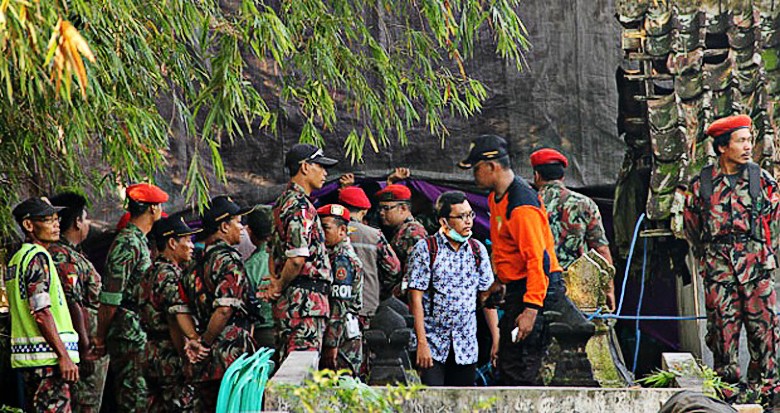Popular Reads
Top Results
Can't find what you're looking for?
View all search resultsPopular Reads
Top Results
Can't find what you're looking for?
View all search resultsCounterterrorism vs upholding human rights
Siyono, 34, who on March 8 was arrested on suspicion of being a terrorist, returned to his hometown, in Pogung, in a coffin five days later—his body showing clear signs of torture. The death of Siyono is the latest example of how counterterrorism measures in Indonesia have the potential for abuse
Change text size
Gift Premium Articles
to Anyone
I
t was the saddest day for the family of Siyono, 34, who on March 8 was arrested on suspicion of being a terrorist, who then returned to his hometown, in Pogung, in a coffin five days later—his body showing clear signs of torture.
In a press conference on April 5, National Police spokesman Insp.Gen.Anton Charliyan admitted the National Police’s Densus 88 counterterrorism unit committed several procedural mistakes and that this would be investigated.
The death of Siyono is the latest example of how counterterrorism measures in Indonesia have the potential for abuse. Security authorities can exploit whatever power they might have in the name of fighting terrorism. In Siyono’s case, for instance, the existence of an arrest warrant that Densus 88 had used to arrest Siyono remains dubious. No state institution so far has admitted to having issued an arrest warrant for the terrorist suspect. Thus, it is questionable for us that under existing legal counterterrorism mechanisms, the government aims to revise Law No.15/2003 on Terrorism to expand the scope of its counterterrorism capabilities.
Despite ongoing terrorist incidents in areas across Indonesia, the government’s plan to revise the 2003 Terrorism Law has drawn concern and criticism, primarily on its potential for rights abuses. In the law’s draft revision, security institutions have wider authority to take measures against persons suspected of terrorist activities. On the other hand, the full scope of authority to address terrorist threats may lead to a significant change in the obligation of the state to respect human rights.
The 2003 Terrorism was a government response to terrorist attacks in Indonesia, which began to intensify in 2000 with a car bomb attack at the Jakarta Stock Exchange. A bombing and shootings near Sarinah, a shopping mall on Jl.MH Thamrin in Central Jakarta on Jan.14, 2016, has shown that terrorism remains a threat to Indonesia’s security despite ongoing counterterrorism measures. Eight people, including four civilians, were killed in the Thamrin incident, which also injured more than 20 people.
Unnecessary abuses during current counterterrorism operations have highlighted the need for clearer standard operating procedures. Alleged violations in the arrest and detention of Siyono have heightened concerns that human rights will be compromised from these counterterrorism measures is something real and must be prevented.
Coordinating Political, Legal and Security Minister Luhut Pandjaitan said the 2003 Terrorism Law revision would give security personnel authority they should have in handling terrorist offences. He said the law revision would empower security elements so that they could take the necessary measures for suspected terrorists. The minister guaranteed the revised Terrorism Law would not be similar to the Internal Security Act (ISA) adopted by Malaysia and Singapore, two neighboring countries widely known for their tough measures in tackling terrorism.
Concerns about potential human rights violations during counterterrorism measures cannot be avoided if we look at additional or revised articles included in the Terrorism Law’s draft revision, however.
Article 43A of the draft revision stipulates: “To tackle terrorism, investigators or prosecutors can carry out preventive measures against any persons suspected to committing a terrorist crime and bring or place him or her in detention that is part of their working area, for 6 months at the longest”.
“Such a measure has the potential to create detention centers, which are unregulated and prone to all forms of misuses of power, especially the implementation of inhumane actions and torture during the interrogation of suspected terrorists, such as what have happened in the Guantanamo Bay terrorist detention center,” Commission for Missing Persons and Victims of Violence (Kontras) coordinator Haris Azhar told thejakartapost.com in a recent interview.
A greater military involvement in counterterrorism measures, which is allowed by the draft revision, has also drawn sharp criticism among human rights groups in Indonesia. It is stipulated in Article 43B of the revision that: “The national policy and strategy in the handling of terrorism crimes is conducted by the National Police, the Indonesian Military and related government institutions along with their respected authorities, which will be coordinated by non-ministry government institutions that handle terrorism prevention.”
This article highlights a greater military involvement in future counterterrorism measures, which will likely push terrorism prevention away from law enforcement approaches. This article will open a room for the Indonesian Military’s involvement in operations other than war, which actually has been regulated in Law No.34/2004 on the Indonesian Military. The law stipulates that any operations other than war involving the Indonesian Military must be based on a political decision jointly made by the President of the Republic of Indonesia and the House of Representatives. Involving the military in terrorism prevention cannot be conducted unless there is a state decision for such involvement.
Passport revocation for every Indonesian citizen proven to be an actor of a terrorism crime as stipulated in Article 12B of the revision not only violates citizenship rights but also has potential for misuse. “Citizenship revocation should not happen as it is a person’s constitutional right,” rights group Imparsial activist Al Araf told thejakartapost.com.
We must learn the lessons from past incidents, including the death of Siyono, that there are real risks of serious human rights abuse through current counterterrorism measures. It is the ultimate responsibility of the state to protect the whole country from terrorist threats. But, we also must keep the risks of the measures, which might severely affect the human rights of the people, in mind.










